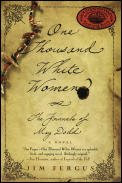Written by Jim Fergus
St. Martin's
Reviewed by Jodie
 Jim Fergus's ‘One Thousand White Women’ is not the book I hoped it would be. Focusing on the fictional life of May Dodd, a nineteenth century American woman who takes part in a secret government program in order to escape her unjust incarceration in a lunatic asylum. Locked away by her family for having an affair with a lower class man and subjected to sexual abuse May will take any chance and so join roughly forty other women sent to join the (fictional) Indian Bride scheme. The program is an attempt by Ulysses Grant to placate the native chiefs with a limited sacrifice of the women deemed undesirable by society. The Indians hope to achieve integration as well as an understanding of white culture through the children of these unions, thinking this will enable their own culture to survive. Of course this kind of intermingling appears abhorrent to the nineteenth century male mind.
Jim Fergus's ‘One Thousand White Women’ is not the book I hoped it would be. Focusing on the fictional life of May Dodd, a nineteenth century American woman who takes part in a secret government program in order to escape her unjust incarceration in a lunatic asylum. Locked away by her family for having an affair with a lower class man and subjected to sexual abuse May will take any chance and so join roughly forty other women sent to join the (fictional) Indian Bride scheme. The program is an attempt by Ulysses Grant to placate the native chiefs with a limited sacrifice of the women deemed undesirable by society. The Indians hope to achieve integration as well as an understanding of white culture through the children of these unions, thinking this will enable their own culture to survive. Of course this kind of intermingling appears abhorrent to the nineteenth century male mind.The subject matter seems perfect for an in-depth exploration of both the fears of occidentalist white men and the gender prejudices thrown up by the experiment. As the book contains scenes of rape and the abuse of female sexuality I thought the women’s minds would be examined thoroughly. This does not happen and instead these incidents were quickly consigned to the past by Fergus’s female characters. Perhaps this is supposed to show the practicality and staunchness required of women living such physical lives but to me it seemed that Fergus was merely promoting the most recent type of female mythology, that of the stoic woman who does not complain no matter what situation she finds herself in. Despite the difference in time period May’s character resembles the default surface personality type of British working women, as portrayed in dramitisations about WWII. The plucky, practical Wren who owes much but not all of her characterisation to the ‘whore with a heart’ stereotype is ever present in May’s tendency to avoid writing deeply about her sexual mistreatment in the asylum. Fergus may have felt that this is how his heroine would deal with the horror of these experiences but surely the point of May’s narrative being presented in letters and journals she never expected her family to see is to make the reader familiar with her and to present a more intimate picture of the character than the face she might show to her own world?
If you can get past these issues then there is an enjoyable narrative to be found. Fergus’s research has helped him to create a detailed mixture of domestic and historical fiction. The daily life of May’s new tribe is chronicled accurately and her ‘civilised’ reaction to the differences between her new society and that of her past explain what led white people to object to the natives. The book is also a credible romantic narrative with both Mays affair with Captain Bourke and her affection for Little Wolf, her Indian husband seeming realistic. Surely it would be hard for a woman who enjoys writing and literature to love a man with whom she cannot communicate.
However, for me the character of May Dodd is not sufficiently developed to sustain a first-person narrative. She never integrates with the natives, continually viewing their arguments and society through the filter of her past life. She learns nothing beyond practicalities from her new life and after two years still believes that the best way for her tribe to live is in the settlement plan advised by the government. She maintains this believe even though her husband clearly outlines why this plan is to the disadvantage of the tribe, showing that she still feel the best way to live is the way that creates benefits for the white world. This unwillingness to seriously consider new ideas is surprising as is her unquestioning acceptance of the wisdom of the authorities. A woman shut away for transgressing societies rules and abused by the authorities responsible for her care ought to show more resistance to established society.
‘One Thousand White Women’ is a disappointing realisation of an interesting historical revision; a great idea badly realised.

1 comment:
It was a "squaws with mascara" tale. Kind of silly.
Post a Comment